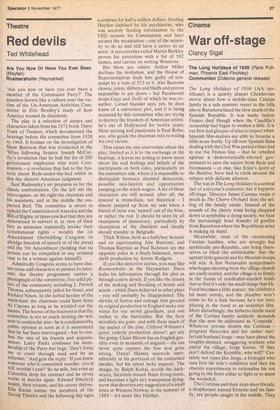Theatre
Red devils
Ted Whitehead
Are You Now Or Have You Ever Been (Mayfair) Rosmershoim (Haymarket) 'Are you now or have you ever been a member of the Communist Party?' The question hovers like a vulture over the victims of the Un-American Activities Committee in Eric Bentley's study of how America treated its dissidents.
The play is a selection of scenes and characters taken from his 1971 book Thirty Years of Treason, which documented the hearings before the committee from 1938 to 1968. It focuses on the investigation of Show Business that was conducted in the 'fifties following Senator Joseph McCarthy's revelation that he had the list of 200 government employees who were Communists — a revelation that led to the hysteria about Reds-under-the-bed which to this day distorts American judgment.
Saul Radomsky's set prepares us for the Classic confrontation. On the left sits the interrogator, on the right the chairman and his assistants, and in the middle the suspected Red. The committee is sworn to Uphold the Constitution of America and the Bill of Rights; at times you feel that they are determined to subvert it, in view of their fury as witnesses repeatedly invoke their constitutional rights — notably the 1st Amendment (forbidding Congress to abridge freedom of speech or of the press) and the 5th Amendment (holding that no Person can be compelled in any criminal case to be a witness against himself).
Admittedly Congress seems to have chosen some odd characters to protect its interests: the theatre programme carries a Photograph of the committee, five solid pillars of the community including J. Parnell Thomas, subsequently jailed for fraud, and Richard Nixon. In the turbid heyday of the witch-hunt the chairman could have been Al Capone as long as he winkled out the names, The horror of the business is that the committee is not so much inviting the witness to confess his sins — he is condemned by Public opinion as soon as it is announced that he has been interrogated — but to confess the sins of his friends and acquaintances. Larry Parks confesses his membership of the Party but begs, 'Don't force Me to crawl through mud and be an informer.' And gets the reply: 'If you knew someone who'd committed murder, you'd tell, wouldn't you?' So he tells, but even so Columbia drop his contract and he never works in movies again. Edward Dmytryk resists, then recants, and his career thrives. Elia Kazan names the members of the Group Theatre and the following day signs a contract for half a million dollars. Sterling Hayden (advised by his psychiatrist, who was secretly feeding information to the FBI) recants his Communism and later recants the recantation — one of the minority to do so and still have a career as an actor. A screenwriter called Martin Berkley proves his patriotism with a list of 162 names, and carries on writing Westerns.
But there are others. Arthur Miller declines the invitation, and the House of Representatives finds him guilty of contempt by a vote of 373 to 9. Abe Burrows clowns, jokes, slithers and bluffs and proves impossible to pin down — but Paramount drops Guys and Dolls of which he was coauthor. Lionel Stander says, yes, he does know of a subversive plot, and it is being mounted by this committee who are trying to destroy the freedom of American artists: he's out of Hollywood for twelve years. Most moving and passionate is Paul Robeson, who goads the chairman into revealing his own racism.
That raises my one reservation about the play: limited as it is to the exchange at the hearings, it leaves me aching to know more about the real feelings and beliefs of the participants on both sides, particularly on the committee side, where it is impossible to distinguish between alarmed democrats, possible neo-fascists and opportunists jumping on the witch-wagon. A lot of these characters are still around, after all; the interest is immediate, not historical — I almost jumped up from my seat when a friend of mine was named' out of the blue, or rather the red. It should be seen by all champions of democracy, particularly by champions of the dissident and ideally should transfer to Belgrade.
Thick Wilson, both as a bullyboy Senator and an equivocating Abe Burrows, and Thomas Baptiste as Paul Robeson are the opposite poles in a finely-balanced, never shrill production by Anton Rodgers.
If you like detective stories, you may like Rosmersholm at the Haymarket. Ibsen leaks his information through his plot as through a sieve slowly. If you like the drama of the making and breaking of hearts and minds — which Ibsen 'achieved in other plays — you will probably be disappointed. The shrieks of horror and outrage that greeted its original production in England make one wince for our moral guardians, and one rushes to the barricades. But the fiery moralists are gone, and with them much of the impact of the play. Clifford Williams's quiet, orderly production doesn't get any fire going. Claire Bloom has an English gentility even in moments of anguish — she can never quite capture the. free soul gone wrong. Daniel Massey succeeds intermittently in his portrayal of the embattled idealist, but his talent lacks support. The design, by Ralph Koltai, avoids the hackneyed, furniture-bound Ibsen living-room, and becomes a light airy transparent dyingroom that destroys any suggestion of a small town in Western Norway in the summer of 1885 — it's more like Habitat,


































 Previous page
Previous page